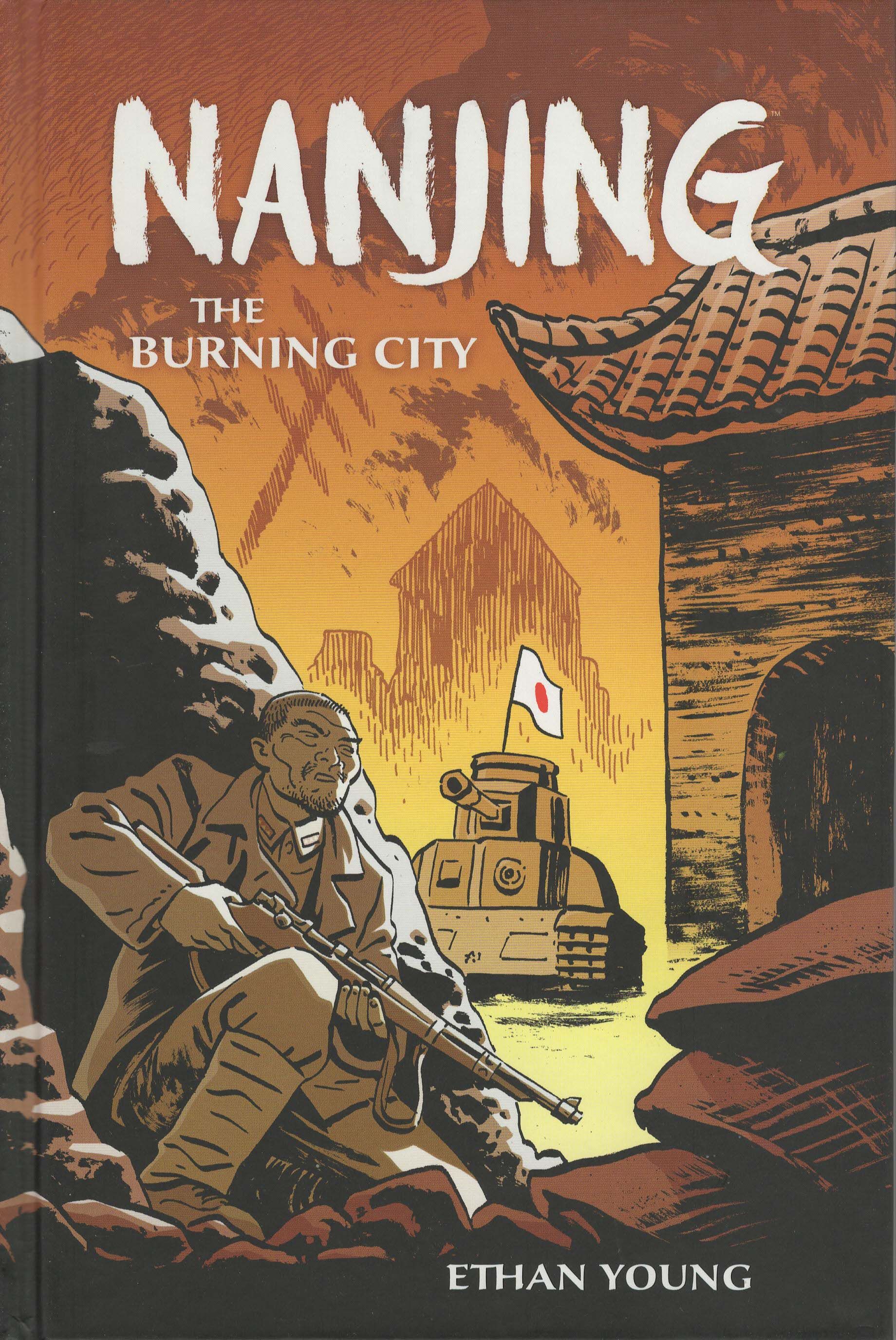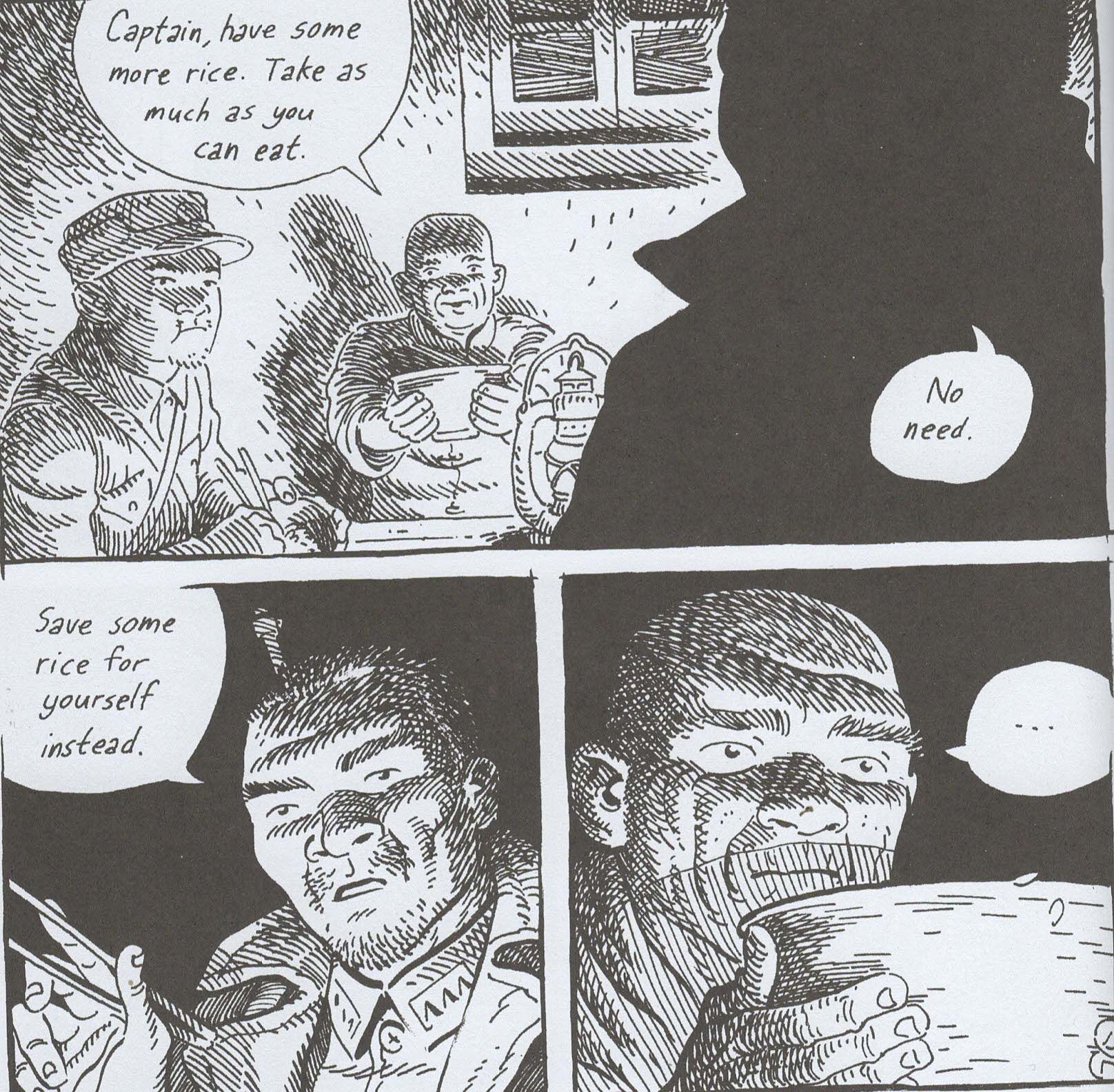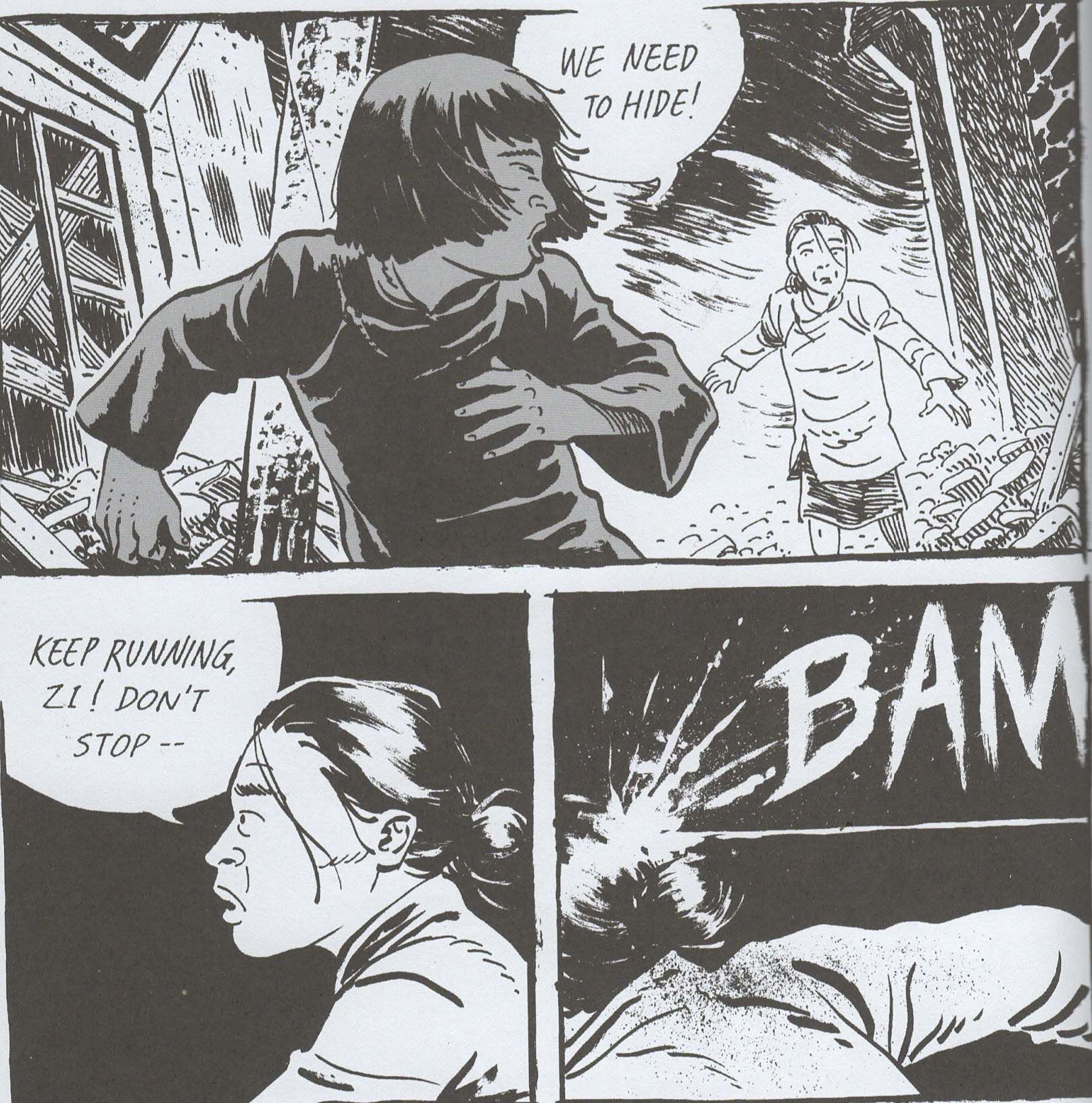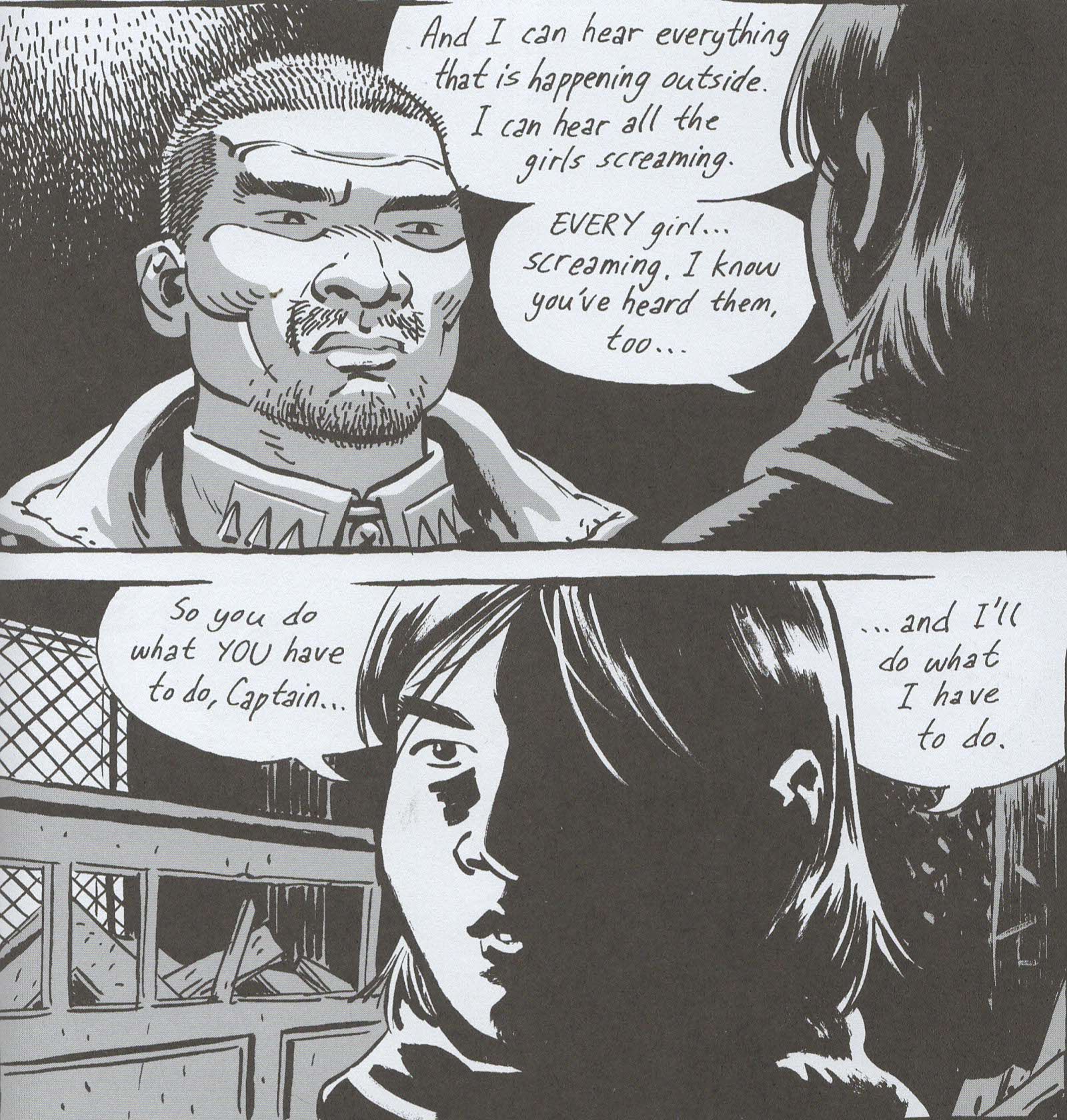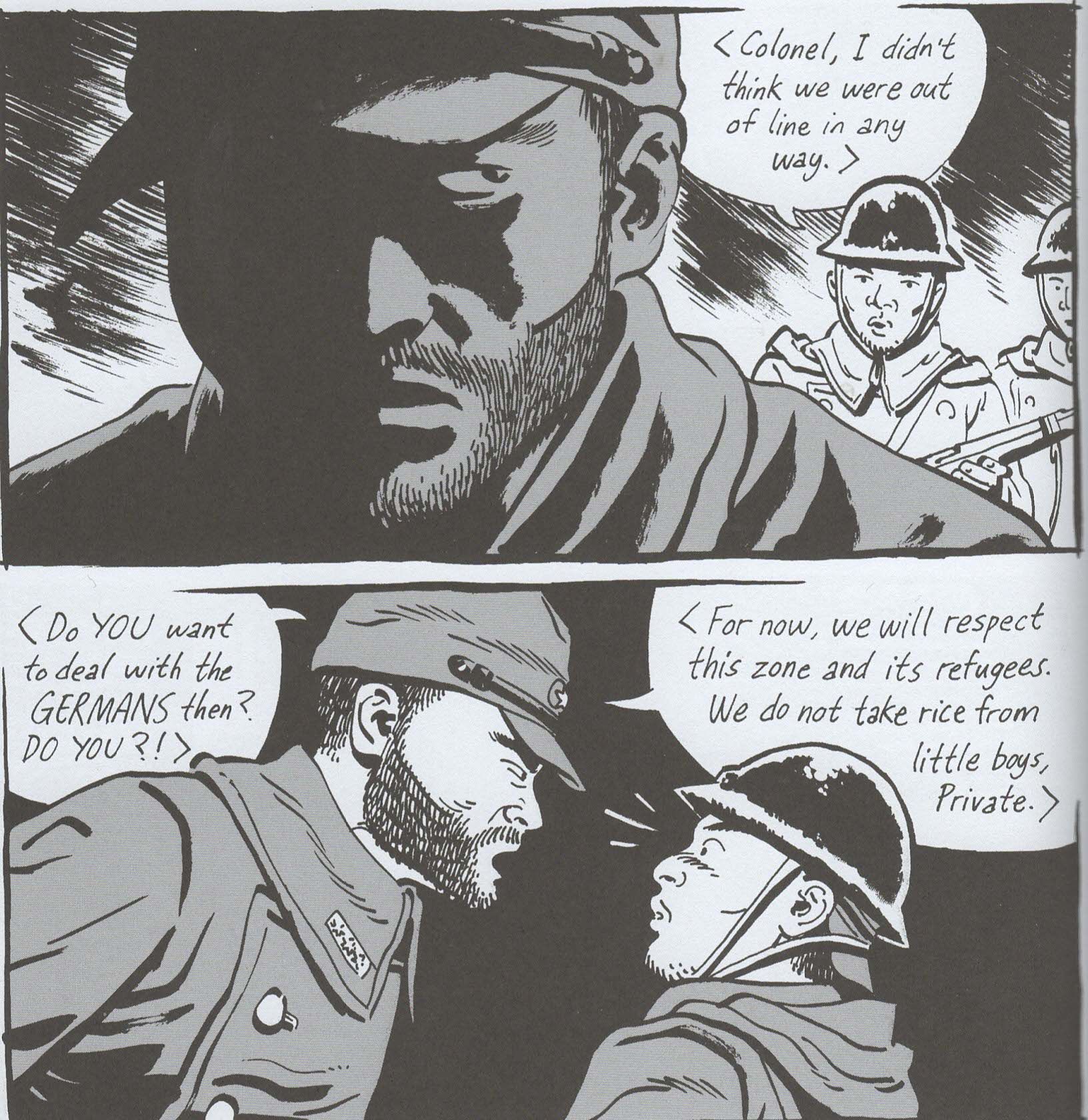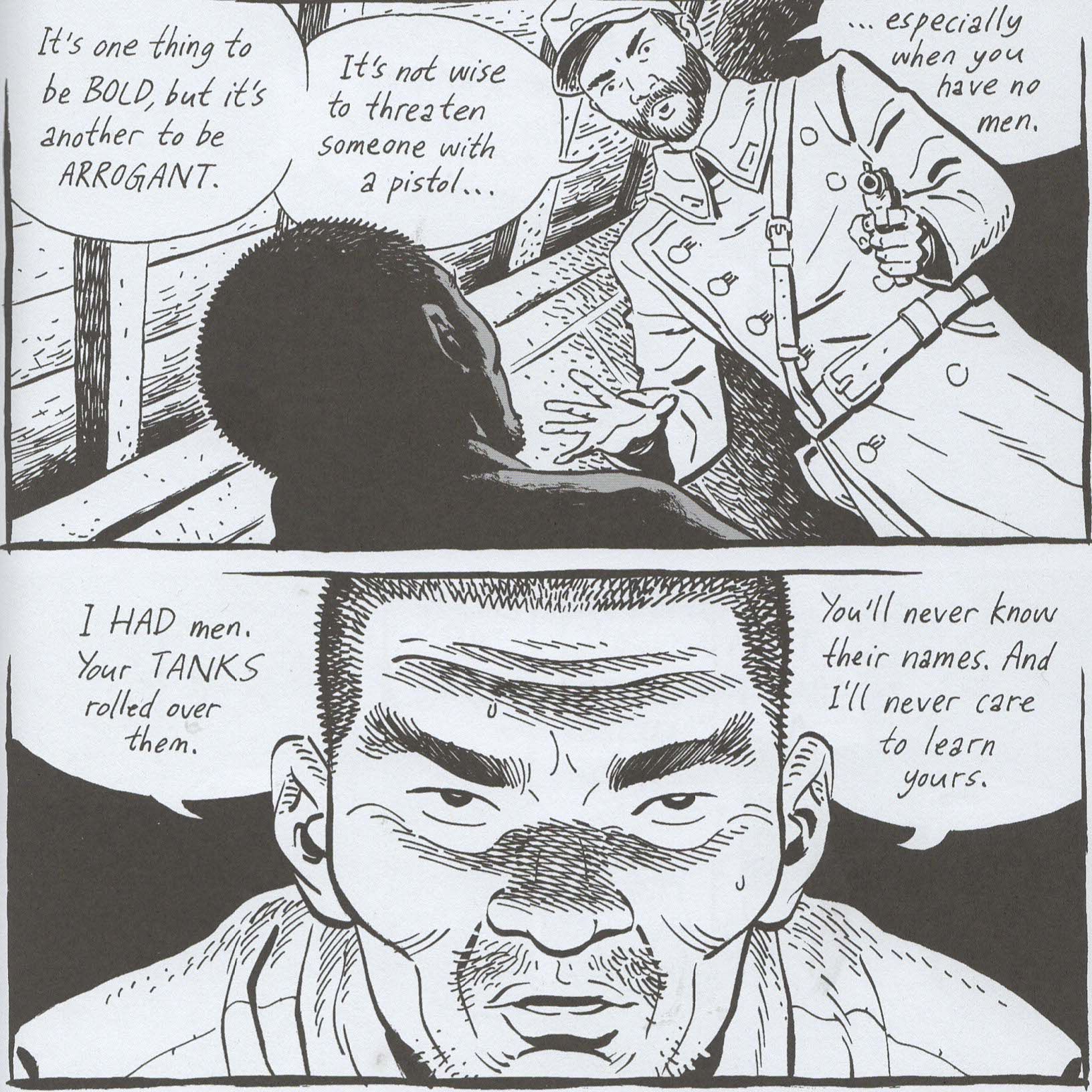"Somewhere old heroes shuffle safely down the street, where you can speak out loud about your doubts and fears, and what's more no-one ever disappears, you never hear their standard issue kicking in your door"
Ethan Young's Nanjing: The Burning City (which is published by Dark Horse after editing by Jim Gibbons and costs $24.99) is a nice big comic that tells about the destruction of Nanjing in 1937 in a different way than you might expect.
But that's partially what makes it so good!
In yesterday's review of The Lion of Rora, I mentioned that the Gages didn't do a great job with the book partly, it seems, because they were trying to cram so much history into it that they forgot to develop the characters very well. This is another book of historical fiction, but Young makes it work much better, mainly because he provides very little of the history and focuses instead on the characters. That might be a function of the event he uses - yes, there was a complex backstory between the Chinese and Japanese that led to Japan's invasion, but if you boil it down, this is "The Japanese invade, destroy Nanjing, and the people trapped in the city are desperate to get out," which is a bit simpler than the world of Reformation Europe. Young dives right into the fray, as he provides a paragraph about the situation in Nanjing and then introduces the two main characters - the Captain and Lu, two Chinese soldiers who were left behind when their commander fled the city, which occurred often, according to Young. Their plight is simple: They need to get out of the city before the Japanese find them, as the invaders are killing every Chinese soldier they come across. Lu wants to head for the "safe zone," which is designated for foreigners and Chinese civilians, but the Captain overrules him and they head north to one of the city's gates, where they plan to cross the Yangtze and get to safety.
Neither plan is great, but that's the situation they find themselves in.
Young doesn't worry too much about the philosophical underpinnings of the war - the characters are trying to survive, and Young crafts the story so that the way war affects people comes out through the action. The Captain isn't a bad guy, but he's been hardened by his years in the army, while Lu is younger, a bit more naïve, but also a bit kinder. So there's some nice tension between them as they encounter people during their trek through the city. Young doesn't sugarcoat war - it's brutal, especially for those people who can't take care of themselves as well, and Young does a really nice job with them. The way they have to treat the weaker characters is tragic, and Lu is upset that they're betraying their principles - soldiers are supposed to defend the non-combatants, but the Captain knows that doing so would get them killed. While Lu is more admirable for his ideals, the Captain is absolutely correct, and Young does a wonderful job making both men right even though they're on opposite sides. There's a great scene in which the Captain and Lu decide to ambush some Japanese soldiers, and even though a few minutes earlier one of them, Yoshi, was berating his comrades because they were raping girls and so we know he's a decent guy, he's still Japanese, and neither Lu nor the Captain are in a forgiving mood.
After the ambush, they're tracked by a Japanese Colonel who, like the Captain, is an experienced soldier, and the book becomes even more cat-and-mouse. Young shows the horror of war in another way, too - Lu is shot, not by the Japanese, but by a Chinese woman protecting her family. When the Captain yells at her, she points out she doesn't really have the luxury of waiting to see if the people around her are friendly or hostile because she's trying to keep her family alive. It's a brutal truth, and the Captain has nothing to say about it. To save Lu's life, he has to get him to the safe zone, and so we get the final act - the woman smuggles Lu into the safe zone, but her husband and the Captain have to stay just outside to cover them in case things got hairy, and the Colonel knows something is suspicious. It's a war story, so things don't exactly end well, but Young makes some nice points before the tense ending - the Colonel points out, rightly, that the Chinese commanders have fled, so why should the Captain be loyal to them? The Captain reaches the same conclusion that Joshau Janavel did in The Lion of Rora - that he's fighting for his land and the people - but Young gets there in a much more organic way, so it feels more convincing. The Captain begins as a pragmatist and he remains one, but he also begins to see better reasons for fighting than simply because you're a soldier. The Captain gets a good speech toward the end of the book as to why the Japanese will not prevail, but he's earned it through his experiences in Nanjing as he saw the despair and defiance of the Chinese and the depravity of the Japanese. Young doesn't make all the Japanese bad - as I mentioned, Yoshi condemns the actions of his fellow soldiers, while even the Colonel is disgusted by the rapes and is only trying to "save" China from the insidious influence of the West (as he puts it) - and, of course, not even Lu is wholly admirable.
These shades of gray help make the book more interesting and make the Captain's defiance when he is captured all the more compelling. Young doesn't glamorize war at all, but he does show that there are things worth fighting for, as long as you can find them.
Young's art is very good, too, and gives us a visceral representation of a destroyed city and the horrors within it. He has a rough style that makes the rubble look more jagged and oppressive, the smoke thicker, and the soldiers more beaten up by the war and the occupation. Even the Japanese soldiers, who should look fresher and more ready to fight, have a world-weariness about them, even as they're preparing to rape someone. Young doesn't drench the book in bloodshed or gore, as some of the more intense moments take place off-panel and we simply see the characters reacting to them. That's always a good way to go, especially with things we can picture for ourselves and therefore our imagination is far worse than anything Young could put on the page. Young places debris everywhere, and that and the close hatching helps with the claustrophobic tone of the book, as Lu and the Captain are constantly finding themselves in tight quarters. When he does open things up a bit - there are a few full-page splashes - it seems it's to show how the Japanese have so thoroughly taken over the city, which is an interesting point. Otherwise, he's backing the Captain and Lu into alleys, basements, and attics, marginalizing them as the Japanese continue to sweep through Nanjing. Obviously, in a black and white book, his use of black is crucial, and Young does a wonderful job with the light - creating shadows for his characters to hide in, using terrific hatching in the old man's room to show the weak illumination he can use, and showing the darkness creeping into the characters as they're reduced to savagery.
He puts the end of the book in a wide space during the day, which is also clever, as the Captain has stepped out of the darkness and into the light of realization and acceptance, so that when he does make his speech about why he continues to fight, he's no longer hiding in shadows. It's a nice moment and a fitting culmination of the visual journey of the book.
Nanjing is a gripping comic, and while it's not exactly the most pleasant comic, it tells a story that should be more well known, especially in the West, and Young manages to do it without descending into preaching about the evils of war. He gives us excellent characters and lets them show us how war affects everyone in many different ways. Naturally, we never learn the lessons of war, but that doesn't mean that writers will stop making us confront them, and Young does a really good job with that. Young provides a nice bibliography in the back in case this spurs you on to read more about the Sino-Japanese War, as this is an excellent primer. I encourage you to check it out!
Rating: ★ ★ ★ ★ ★ ★ ★ ★ ☆ ☆

